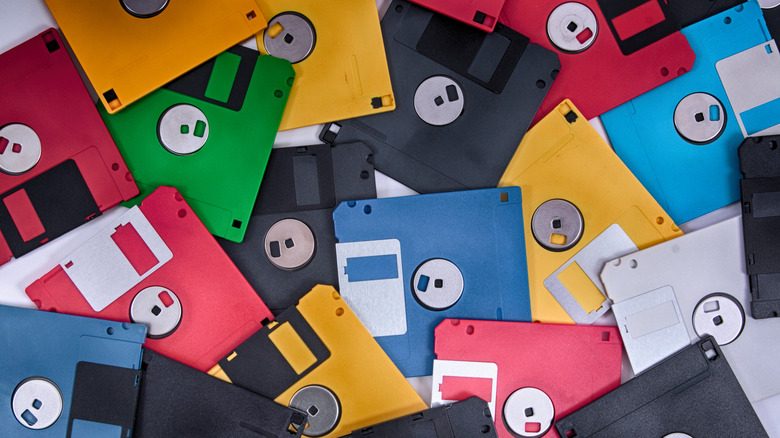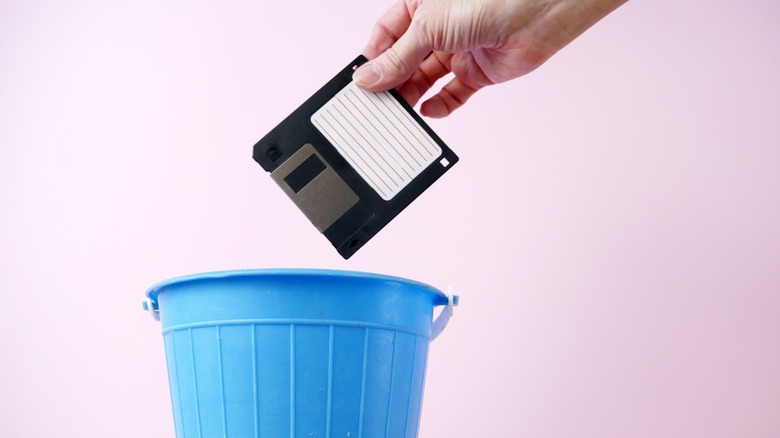These Important Industries Still Use The Seemingly Dead Floppy Disk
Do you know that funky-looking square icon you click at the top of your toolbar when you want to save a document? That's not some random hieroglyphic. That's a floppy disk, and it wasn't that long ago that people saved their digital media to actual, physical floppy disks.
Once an industry standard, floppy disks were eventually replaced by CDs, which were replaced by flash drives and cloud-based storage. One of the most common types of floppy disk was the 3.5 inch (which ironically — unlike its larger brethren — wasn't actually floppy). A standard 3.5-inch disk would hold 1.44 megabytes — not even enough space to store a single photo captured by current-gen smartphones.
Don't let its small size fool you. Floppy disks still have a few advantages over more modern technology. As Tom Persky, the president of floppydisk.com, told NPR in a 2022 interview, floppy disks are "extremely stable, extremely well-understood, not really hackable, and performs an unbelievably great job for very small bits of data."
That's exactly why Persky, who buys and sells floppy disks, still has a successful business. After all, it's not like 20 years ago when you could run to the local Best Buy and buy a 50-pack of floppies. These days, they're decidedly more niche. While plenty of computer enthusiasts still play with the old-school tech, Persky also sells the physical media to some surprisingly important buyers.
Where are floppy disks still used?
Those important buyers include some heavy hitters in the airline industry. British Airways, for example, was using floppy disks on some of their Boeing 747s as recently as this decade. Considering a 747 jumbo jet can hold as many as 524 passengers, that's a lot of people flying around on planes using a seemingly-dead technology.
Many of those planes were built over twenty years ago when floppy disks were still a mainstream way of storing digital media. Navigational data and other avionics could be easily moved from one plane to another using the disks. Since some of those planes are still around, so is the need for disks compatible with their hardware.
That same reasoning is behind the continued use of floppy disks in other industries, including the medical sector. Systems that rely on floppy disks for electronically storing patient records and other critical medical data are still in use worldwide. As recently as 2015, Norway's government even gave its doctors a floppy disk each month for record keeping.
Some embroidery companies also still use the technology, as well as some industries that employ Sony Mavica cameras, which rely on floppy disks the same way modern digital cameras use microSD cards. You may have even withdrawn cash from an ATM still utilizing the not-so-cutting-edge technology.
Floppy's days are numbered
While it may be surprising that floppy disks are still used in some major industries, don't expect them to be around forever. The Boeing 747s were built when the floppy reigned supreme and are now being phased out and replaced by newer fleets, which of course, use newer technology.
Likewise, the medical industry is also striving to catch up to the 21st century. While Norway was cool with giving its doctors monthly floppy disks, it was also getting ready to force them to upgrade — whether they wanted to or not.
Even the United States' nuclear forces are phasing out floppy disks. That's right — the world's largest, most destructive arsenal of nuclear weapons has been relying on computer systems from the 1970s that use 8-inch floppy disks.
The government needed to spend billions of dollars yearly to maintain the antiquated system. Some of that cost came from the fact that necessary replacement parts no longer exist. Because of these high costs, the Defense Department eventually conceded that the time had come to update the technology responsible for the most powerful weapons on earth.
As older computers still used by some surprisingly important industries break down and get replaced by newer, more modern systems, it's clear the days of the floppy disk are numbered. It's just a matter of time before the floppy disk will only exist as that strange little save icon at the top of your toolbar.


